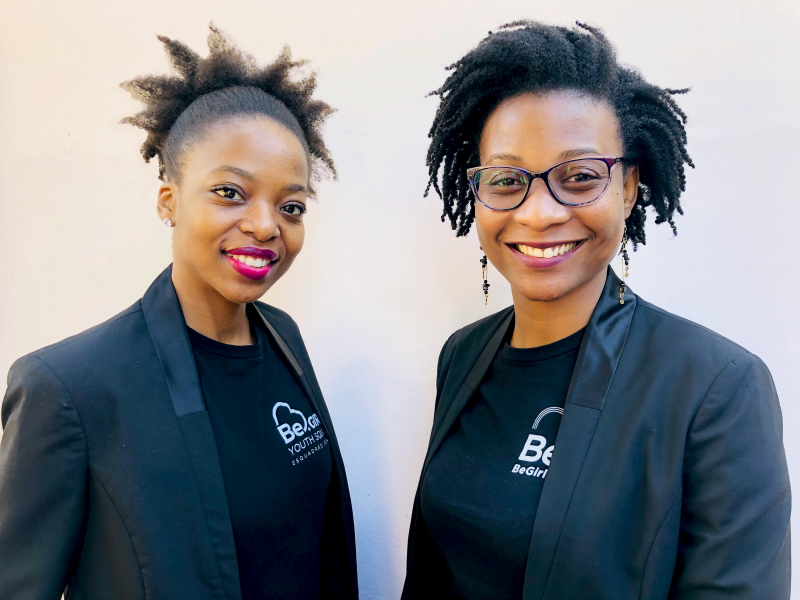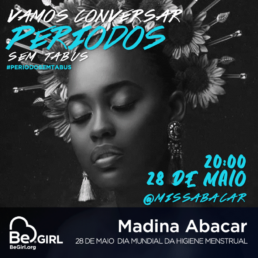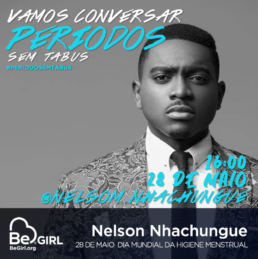“We put ourselves in the shoes of the people that we wanted to reach.”
Be Girl is a social enterprise that creates menstrual products, education, and messaging to build a world where all girls can understand, own, and love their bodies. Two of Be Girl Mozambique’s leaders, Cídia Chissungo and Malaika Mongo sat down with Audrey Anderson Duckett, Be Girl’s COO, to share how they approached Menstrual Hygiene Day a little differently this year to open up conversations about periods in unprecedented ways.

Cídia Chissungo is the Social Impact Director at Be Girl Mozambique. Her background is defined by activism engagement across the African continent and she has created one of the biggest youth movements in Mozambique advocating for education, economic development, and political inclusion.
Malaika Mongo is Be Girl Mozambique’s Commercial and Operations Director, where she brings combined experience with both non-governmental and corporate institutions. She was a participant in Graça Machel’s “MyWil” Young Women in Leadership Program, and she has experience undertaking entrepreneurial ventures in the past.

Audrey: Can you give us a little background on Menstrual Hygiene Day? What is it, and how is it typically recognized or celebrated?
Cídia: Menstrual Hygiene Day is a day where organizations that work with girls and menstruation take time to raise awareness about the need to make sure that girls have access to education but also [menstrual] products. They raise awareness and work with the government to advocate for things like toilets in schools and access to water. And normally what they do is to organize events where they could share a little bit of their work.
Be Girl Mozambique decided to take a different approach this year. What did you do?
Cídia: For Be Girl, compared to what we did last year – which was a public event with the government and other organizations – we thought about doing something very different that could impact people and also be relevant for them. Not only as a date on the calendar, but something that they can own and share with their friends. So, this year, we organized Instagram Live videos because people cannot gather [due to COVID-19]. We went to TV shows because we know that people are also at home, and this is a different audience from the Lives. We also went to the radio to reach those with limitations of access to the internet and to TV – but they use radio.
Malaika: We interviewed people such as [stylist and entrepreneur] Miss Abacar and [R&B artist] Nelson Nhachungue, which are artists and/or influencers within Mozambican society that have quite a large following as individuals and as brands. So, we thought of speaking to people who already have a certain pull in society so they could make their demographic more aware of the conversations we were going to have.

BeGirl Mozambique held Instagram Live conversations about periods with influencers such as stylist Madina Abacar. Malaika explains:
“If we get cool people to speak about menstruation in a way that is non-technical then we had a better chance of reaching a large audience.“
Audrey: Why did you decide to take this approach?
Malaika: Well, because menstruation is still something that is very taboo in Mozambique, we thought that if we get cool people to speak about it in a way that is non-technical, then we had a larger chance of reaching a large audience. So, it was important to us to try and be in as many demographics as possible, in terms of age, in terms of social class. So, we chose key people within different niches in order to get everybody paying attention to the information.
Cídia: Also, information about menstruation already exists, but people don’t always get access in a way that is useful for them. We cannot do things in the same way and expect different results.
“Information about menstruation already exists, but people don’t always get access in a way that is useful for them. So, we thought that we cannot do things in the same way and expect different results.”
-Cídia Chissungo, Social Impact Director, Be Girl Mozambique
Audrey: You were meeting with a lot of popular influencers who have huge followings on social media. Who were you most excited about?
Malaika: There wasn’t one person in particular, but I was very excited to speak to men! I was actually quite excited to hear what they would have to say or how they would react to the conversation as a whole. Their insights were always very different, because women already have experience in actually having periods.
For the men, it was interesting to watch them explain to us what their encounters have been like, like did they hear about menstruation from a sister or a girlfriend, how they help their spouses or sisters or cousins or the females around them, what they think about periods being considered something dirty. We had one who said that, for example, if a girl had stained her outfit, he would help. Another had said that he would buy feminine products if their spouse needed them. Another said he would teach his child alongside the mother. Those different takes from men were interesting because it helps open doors for other men to start having these conversations openly amongst themselves.

The MH Day Conversations weren’t limited to women! Be Girl spoke with a number of male influencers such as R&B artist Nelson Nhachungue.
“It was interesting to hear [the men’s] responses because each of them was always very unique. It also helps to open doors for other men to start having these conversations openly amongst themselves.” – Malaika
Cídia: The person that I was excited about talking to was [activist for the rights of children with disabilities] Benilde Mourana. She explained a little bit about her experience with menstruation and also an experience she had with her daughter. One day, her daughter asked her about menstruation, and she felt a bit constrained to talk about it, and she told her to go and talk to her father. And her husband explained everything to her daughter. For me that was interesting, because sometimes we say that men do not care and they don’t really want to know anything about menstruation. I was so impressed by the fact that they said, “Okay, go to your father.” She didn’t blame herself for the fact that she doesn’t feel totally prepared to talk about it. She knows that parents are parents; it’s 50/50. So, if she cannot have that conversation, at least she could have the support of her husband, and she did have that support. It’s very different from what we hear all the time, about how fathers cannot talk about this.
Audrey: Was there anything that surprised you about the conversations?
Cídia: People are really interested in having this conversation, but I have the feeling that they don’t have enough space to talk about it. Because, for example, as girls, we see periods every day, but we don’t talk and share experiences. So, it was really interesting; everyone wants to have these conversations. They just need space. Also, people have access to information about menstruation, but it’s not always something that makes them feel good or positive about their bodies. The approach that we use makes them feel like, oh, this is really interesting; it’s not just a bad thing.
Malaika: One of the things we did in the Lives was we got everybody accustomed to the fact that every human being was a “potential period.” That tended to be a very good icebreaker for the men at least, because sometimes you would watch them get uncomfortable, and so we would just say, “Well, think about it this way – you were a potential period. But, then you got fertilized!”
Audrey: Were there any quotes from influencers during the Lives that stood out to you in particular?
Cídia: For me, this quote from Benilde stood out: “It is important to break the taboos around menstruation at the same pace as openly discussing the challenges of disability. The lack of information about menstruation weighs on children with disabilities as a double stigma, and is even more difficult to combat.” We are used to hearing about everything related to menstruation, but for me this was the first time I saw it associated with disabilities. Learning more about the challenges that women with disabilities face during menstruation made me more empathetic.
Malaika: My favorite quote was from Miss Abacar: “Our school curriculum should be revised in order to accommodate life issues, such as menstruation, in a way that breaks taboos and is easier to understand.” I think that this quote is impactful due to the fact that it holds so much truth – if we educate the children within our society now, they will grow to be better-equipped adults when it comes to the female reproductive system, and that will cause a ripple effect of knowledge and conversations.
Audrey: There is a lot of talk about the value of processes that are led by women, or young people. How do you feel that you were able to shape this process in a way that is fresh and new and different?
Malaika: We took away the formality of it all. That led people to feel as if they were having conversations with family or with friends. We let people be at ease around the topic as opposed to making it a stiff conversation. So even in the way that we presented when we went to TV, when we went to radio, and the Lives and the webinar, it was always very cheerful and uplifting so that people got a sense of ease. The second thing that we did was in terms of visuals. We knew that we wanted it to be bright and eye-catching. [Be Girl CEO] Diana actually helped us a lot in making the campaign a vibrant one, visually, in order to capture the younger audience’s attention.
Cídia: It was also important that we put ourselves in the shoes of the people that we wanted to reach. That way we were strategizing and thinking: “If we ourselves were hearing about menstruation, how would we catch the message in a way that’s not boring as usual, but something that’s fun and adds fun to our life?”
Audrey: You’ve gotten an amazing conversation started. What’s next?
Cídia: When we went to TV and radio, we were invited to go back and talk more about it. We want to keep creating momentum and make sure that it will not be boring! It will be something very interesting and fun. We want to keep doing a lot of activities and combine them in a way that will be impactful for those that will be watching us. We are thinking about bringing different people, specialists who can talk more about health, about sports. So, we are still creating. We want to keep this very novel.
Audrey: What’s your hope for Menstrual Hygiene Day in the future?
Malaika: I’d like to see the day be celebrated more. I don’t think most people even know that there is a Menstrual Hygiene Day. I would like to see it celebrated the same way that we see Mothers’ Day or Fathers’ Day celebrated.
—
Thank you Cídia, Malaika, and Audrey! We hope your event is an inspiration to others in their attempts to open up conversations around menstruation. If you have any questions about MH Day in Mozambique, please reach out to hello@begirl.org. Follow Be Girl Mozambique on Facebook (@BeGirlMoz) and Instagram (@BeGirlMoz) to keep up with how they’re rewriting the narrative on periods in Mozambique.


